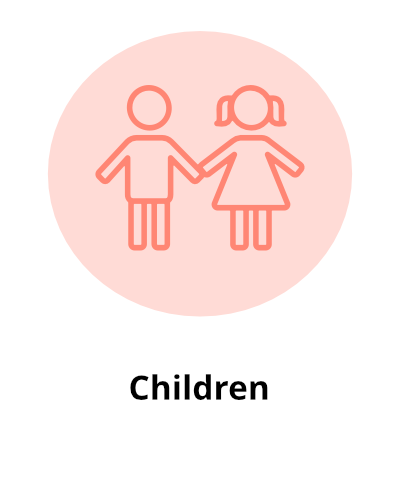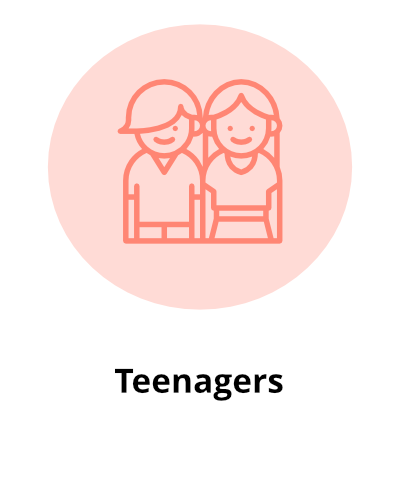Overactive/Impulsive Cluster
Home > TAND Clusters > Overactive/Impulsive > What to do > Teenagers
Teenagers
Any of the tips for younger children can be adapted to be made more age-appropriate, including young people with autism, intellectual disability, or complex needs. Be mindful that strategies and techniques that worked during the school-age years may be too controlling or demanding in adolescence.
It is important to identify opportunities where you can foster their independence and allow them to manage their own schedule. Constant prompts and re-direction may become overwhelming in the teenage years. Help them to set their own goals and routines and give them space to make more choices and organise their own day where possible. Schoolwork also becomes more difficult during the teenage years, which can place additional stress.
Below are some additional tips if you are a caregiver supporting a teenager or young person who does not have a severe intellectual disability. Further resources can be accessed in the resource panel.
Strategies to Help Learners With ADHD
[i.pinimg.com]
Neuropsychological Cluster: What to Do
[tandtoolkit.org]
Eat/Sleep Cluster: What to Do
[tandtoolkit.org]
Open lines of communication
- Pick your battles. Small acts of teenage rebellion do not always warrant a response. Respond to minor behaviours with ‘active ignoring’ – do not provide eye contact or verbal responses to rude outbursts, pestering or swearing. Focus more time and attention to challenges and behaviours that contradict the routine and schedule that is in place for their well-being (e.g. time in their schedule for homework, keeping a consistent bedtime routine, encouraging healthy eating and exercise).
- Have honest and open discussions about social and emotional concerns (e.g. bullying, romantic relationships, peer pressure). This does not always need to be with the caregiver, but could be with a teacher from school, or professional counsellor. Monitor any changes in their emotional or physical health, and seek additional support from educators, health professionals, family support groups, and/or ADHD organisations if necessary.
- Have regular and open conversations around medication use and management. Medication diversion and abuse may occur if the person you care for is prescribed ADHD medication. Talk to the person you care for about the risks and consequences of sharing/selling medication or mis-using their prescription. Seek additional support from educators, health professionals, family support groups, and/or ADHD organisations if you are concerned.
- Talk openly about ADHD medication use and side effects. Consider a trial period without medication under medical supervision if the person you care for wishes to discontinue their medication. Draw up conditions to determine whether the trial period has been effective and which factors might illustrate the need to resume medication (e.g. change in behaviour or academic performance). Evaluate and re-evaluate medication use and dose regularly.
- Provide descriptive re-direction when it is needed. Tell them exactly why their behaviour is unacceptable or inappropriate (e.g. do not swear at your brother – take some time out to calm down). Once the conflict situation has de-escalated engage in a meaningful discussion about rules and boundaries and listen attentively and respectfully to their feelings and emotions.
Setting boundaries
- Respect their right to privacy. Knock before entering a room and set clear boundaries around privacy (e.g. having friends over, curfews, going out at weekends).
- Create space in your home that is a ‘calm zone’, their space to calm down during moments of frustration and anger.
- Establish rules and expectations together, and reiterate what these rules are regularly (e.g. what will happen if they come home after curfew on a school night). Create time in your schedule to talk through concerns and help them to label their emotions following a period of anxiety, frustration or anger.
- Set clear expectations together, involve them in making a ‘contract of rules’ and be consistent in your approach when mistakes are made. Be mindful regarding specific risk-taking behaviour in adolescence (e.g. internet use, social media use, driving, consuming alcohol).
Daily schedules
- Enquire about workload, timetables and homework schedules if there is a change in their mood or well-being. Have honest and open discussions about stressors at school and help problem-solve with teachers if there are aspects of the school day that are overwhelming (e.g. quiet spaces, additional time for academic tasks). Schoolwork becomes more difficult during the teenage years, which can place additional demands on a child’s executive functioning skills (e.g. planning, organisation, multi-tasking). There may be particular triggers or signs of stress in relation to school (e.g. peer pressure, academic under-achievement, homework, exams, workload).
- Involve them in regular household chores with a structured routine outlined in a family calendar (e.g. a colour coded planner in the kitchen with allocated chores for all family members across each day).
Encouragement
- Provide descriptive praise and encouragement. Tell them exactly why you are pleased with their behaviour (e.g. well done for staying on task and finishing your homework).
- Encourage them to make use of technology and apps for time management, routines and planning (e.g. set alarms and reminders on their phone for important tasks).







